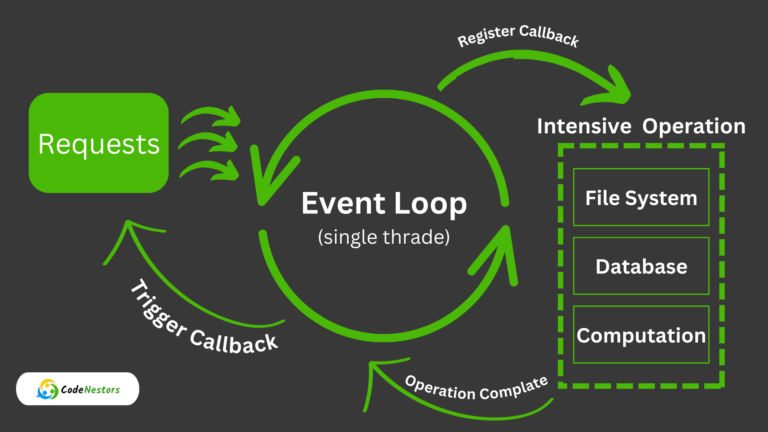What is a Session And Why We Should use Session in Nodejs
In the context of How to Use Sessions in Nodejs sessions are particularly valuable for maintaining stateful interactions with users. In this comprehensive guide, we will delve deep into what sessions are their benefits in Node.js various ways to use them and provide detailed examples to enhance your understanding.
What is a Session
A session is a fundamental concept in web development that provides a way to maintain state across multiple interactions between a user and a web application. It acts as a bridge between the stateless HTTP protocol and the need for applications to remember information about individual users.
How Sessions Work
Sessions work by creating a unique identifier for each user, known as a session ID. This identifier is typically stored as a cookie on the user’s browser, although it can also be appended to URLs or stored in other ways. The session ID allows the server to associate subsequent requests from the same user with a specific session, thereby preserving user-specific information.
Statelessness in HTTP
HTTP, the protocol underlying the web is stateless, meaning that each request from a client to a server is independent and doesn’t carry any information about previous requests. Sessions address this limitation by introducing a layer of statefulness, enabling web applications to recognize users and remember data across multiple requests.
Session Components
- Session ID: A unique identifier assigned to each user during their visit to a web application. It is crucial for associating subsequent requests with the user’s session.
- Session Data: The information stored on the server associated with a specific session. This can include user preferences, authentication status and any other data relevant to the user’s interaction with the application.
Session Lifecycle
- Session Initiation: The session begins when a user accesses the web application for the first time. A unique session ID is generated and associated with the user.
- Data Storage: As the user interacts with the application (logs in, adds items to a cart etc.), relevant data is stored in the session on the server.
- Session ID Transmission: The session ID is sent back to the client, usually as a cookie, ensuring subsequent requests from the same user can be associated with their session.
- Data Retrieval: The server retrieves and updates the session data based on the session ID with each incoming request.
- Session Termination: The session ends when the user logs out, the session expires, or under specific conditions defined by the application.
Why We Should Use Session, Cookies and Middleware in Nodejs
In the realm of web development, managing user session and state is pivotal for delivering personalized, secure and dynamic experiences. Node.js empowers developers with tools like..
How to Use Sessions in Nodejs
Nodejs provides various modules and libraries to handle sessions. One popular choice is the express-session middleware. Here’s a basic example of setting up and using sessions in an Express.js application.
Installing express-session
Before using sessions, install the express-session middleware using npm:
npm install express-sessionSetting Up Sessions in ExpressJS
Integrating sessions into an Express.js application involves configuring the express-session middleware. In the example below, we set up a basic Express.js server with session management:
const express = require('express');
const session = require('express-session');
const app = express();
app.use(
session({
secret: 'your-secret-key',
resave: false,
saveUninitialized: true
})
);
app.get('/', (req, res) => {
// Access session data
let username = req.session.username || 'Guest';
// Modify session data
req.session.username = 'John';
res.send(`Hello, ${username}!`);
});
app.listen(3000, () => {
console.log('Server listening on port 3000');
});Explanation
- Secret: A secret key used to sign the session ID cookie. It enhances the security of the session data.
- Resave: Forces the session to be saved back to the session store, even if no changes have been made. Set to false to prevent unnecessary writes.
- Save Uninitialized: Forces a session that is “uninitialized” to be saved to the store. An uninitialized session is a new and not modified session.
Accessing and Modifying Session Data
Once the session middleware is set up, you can access and modify session data within your routes. In the example above, the username is accessed from the session and if it doesn’t exist, a default value of ‘Guest’ is used. The username is then set to ‘John’ for the current session.
Multiple Ways to Store Sessions
express-session supports various session stores, such as in-memory store, file store and database store. You can choose the one that best fits your application’s requirements. For example, using the express-session with the connect-mongo module for MongoDB.
const session = require('express-session');
const MongoStore = require('connect-mongo');
app.use(
session({
store: MongoStore.create({ mongoUrl: 'your-mongo-db-url' }),
secret: 'your-secret-key',
resave: false,
saveUninitialized: true
})
);Session Timeout and Expiry
Configuring session timeout and expiry is crucial. You can set the cookie.maxAge property to control the session’s duration. Additionally, some session stores provide automatic cleanup of expired sessions.
Session Examples : How to Use Sessions in Nodejs
User Authentication
// Check if user is authenticated
app.get('/dashboard', (req, res) => {
if (req.session.isAuthenticated) {
res.send('Welcome to the dashboard!');
} else {
res.redirect('/login');
}
});Shopping Cart
// Add item to the shopping cart
app.post('/add-to-cart/:item', (req, res) => {
if (!req.session.cart) {
req.session.cart = [];
}
req.session.cart.push(req.params.item);
res.send('Item added to the shopping cart');
});
Benefits of Sessions in Nodejs
Sessions in Nodejs offer a multitude of advantages that contribute to the development of dynamic, interactive and secure web applications.
Stateful Interaction
In traditional stateless HTTP applications, every request from a client is independent, lacking any knowledge of the user’s previous interactions. Sessions introduce statefulness by allowing the server to maintain information about the user across multiple requests. This is particularly valuable for scenarios requiring user authentication or the preservation of personalized settings.
Example
Consider a user logging into an e-commerce site. With sessions, the server can remember the user’s login status, providing a personalized experience throughout their visit.
Enhanced Security
Sessions contribute to the security of web applications in several ways. By storing user-specific data on the server and transmitting only a session identifier to the client, sensitive information, such as user credentials, is less exposed to potential threats. Additionally, sessions support secure mechanisms for managing authentication and authorization.
Example
A session-based authentication system ensures that sensitive user information, like passwords, is kept on the server. Only the session ID is transmitted over the network, reducing the risk of interception.
Customization
Sessions are highly flexible and can be customized to store any user-specific data deemed necessary for the application. This versatility allows developers to tailor the session management system to the unique requirements of their project.
Example
A social media platform might use sessions to store user preferences, such as theme choices, language settings, or notification preferences, providing a personalized user experience.
Scalability
As applications grow and scale, maintaining stateful interactions with users becomes challenging. Sessions address this issue by allowing the distribution of user-specific data across multiple servers. This ensures that regardless of the server handling a particular request, the user experience remains consistent.
Example
In a load-balanced environment, sessions enable each server to access the same session data, ensuring a seamless experience for users interacting with different servers.
Improved User Experience
Sessions contribute significantly to enhancing the overall user experience by providing continuity and personalization. Users can navigate through an application without repeatedly authenticating and their preferences and settings persist across visits.
Example
An online shopping platform using sessions can retain items in a user’s shopping cart even if they close the browser and return later, offering a convenient and seamless shopping experience.
Why Use Sessions in Nodejs?
- Express Middleware: Nodejs, with its popular web framework Express, provides the express-session middleware, simplifying session management.
- Compatibility: Sessions work seamlessly with other Nodejs modules and libraries, making them a natural fit for the Nodejs ecosystem.
- Community Support: The Nodejs community actively maintains and supports session-related modules, ensuring reliability and security.
Advantages of Using Sessions
- User Recognition: Sessions enable the server to recognize and differentiate between users, allowing for personalized interactions.
- Data Persistence: User-specific data can be stored and retrieved, providing a seamless experience across multiple requests.
- Security: By keeping sensitive information on the server and only transmitting a session ID, sessions contribute to enhanced security.
- Scalability: Sessions allow for the distribution of user-specific data across multiple servers, aiding in the scalability of web applications.
Disadvantages and Challenges
- Server Storage: Storing session data on the server requires resources and large-scale applications may need efficient mechanisms to handle sessions.
- Scaling Challenges: Maintaining session state across multiple servers in a load-balanced environment can pose challenges but can be mitigated with proper session management strategies.
- Session Fixation Attacks: If not implemented correctly, session management can be susceptible to attacks such as session fixation. Developers should be aware of best practices to mitigate such risks.
Conclusion
Sessions in Nodejs are a powerful tool for building dynamic and personalized web applications. Understanding their benefits, usage and multiple use cases is crucial for delivering a seamless user experience. By leveraging sessions effectively, developers can enhance security, maintain user-specific data and create scalable applications.
Remember to tailor session management to your application’s specific requirements and always prioritize security to ensure a robust and reliable user experience.
FAQs
Are sessions secure?
Sessions can be secure if implemented correctly. Use secure session management libraries and store sensitive data securely.
Can sessions be used in a stateless environment?
While sessions are inherently stateful, techniques like token-based authentication can be used to achieve statelessness.
Can sessions be used in a stateless environment like RESTful APIs?
While sessions are inherently designed for stateful interactions, they can be adapted for use in stateless environments like RESTful APIs. Token-based authentication is a common approach, where a token serves as a stateless representation of a session. This allows for authentication and authorization without the need for server-side session storage.




